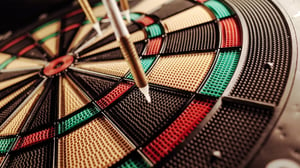Here are 5 things you should be aware of, to increase your chances of reaching your goals:
1. Goals in different parts of life
Most people who read this text are accustomed to setting goals for their jobs and careers – but perhaps not for their relationships, personal development and leisure time. While companies and careers are moving forward, everything else continues the same way as it always has. This can lead to that once you lay out your life, you may realize that you are dissatisfied with how your leisure time is spent. That’s why you usually begin coaching by creating a life wheel, where you map life in 8 areas and then evaluate how satisfied you are with these. The areas are:
- Physical environment
- Health
- Career
- Personal development
- Relationships
- Romance
- Money
- Leisure and recreation
2. Values
Values have historically been abstract and unclear to me. Although, it becomes clearer the more I work with it, that values are what’s important to me. I’ve always known what’s been important to me – many can attest to that. However, it’s the term values that has been unclear to me. For me, for example, it’s super important that you’re always doing your best, that you’re accountable and that you are honest. Those are my values. When I build my company, it’s important that we constantly try to learn new things, that we have fun at work and that we also take responsibility to always do our utmost. Hence why Naes & Friends’ values are curiosity, joyfulness and accountability.
In coaching, it’s important to understand a person’s values, because that’s the foundation of who that person is. There are also values behind each goal, and it’s important to understand them. If you try to coach yourself, you have to know your own values.
3. Process goals
Most of us have set different types of goals in our lives. It can be anything from studying a specific program, to saving up to buy a home, or losing 10 kg. All of these goals are different types of destination goals. Generally, we are better at setting these kind of goals than we are at setting process goals.
What are process goals? Process goals are the journey to the goal – which in itself is filled with a number of minor goals. For example, if your destination goal is to save 1 million SEK, then process goals could be:
Interim goals & proof of progress
– How much to save each week – for example 1000 SEK/week
– Different levels you see as interim goals on the way to your bigger goal, such as 50,000 SEK, 100,000 SEK and so on
New habits
– Habits you should acquire to reach your goal, such as cycling to work or bringing your lunch box
Resources
Resources
– Resources can be, for example, knowledge you want to acquire, people who support you along the way, or role models to look up to
Process goals are thus what help you reach the goal. It’s a way to break down the goal to make it more manageable.
4. Our representation system
We have a representation system that we use in everything we do; to remember, plan, learn, fantasize or solve problems.
The visual system processes what you see. You use it to create images and visualize, but also to create visual memories. That applies whether it’s how you remember something that has happened, or whether it’s something you imagine in the future. It may be the white sandy beach you visited during your vacation, or how you dream of living in the future.
The auditory system is about what you hear. Sounds, voices or words – both our own and others. For example, if a certain memory pops into your head when a song is playing, you use your auditory system.
The olfactory system and the gustatory system are about aromas and flavors respectively. To me, freshly cut grass is the definition of summer, and eating mom’s food is like sleeping pills for me, cause it makes me relax.
The kinesthetic system is what you feel – both internally and externally, including touch. It can be anything from dipping your finger in the ocean to waves of happiness.
The five senses are developed differently in all people. As a coach, you need to understand what’s important to a certain client, to help them move forward.
5. Beliefs
Beliefs are the rules that govern your life. These can be powerful and help you reach your goals. They can also be the obstacles that stop you from achieving your goals. Right now, I’m reading a book on the topic called “The Big Leap” by Gay Hendricks, which is talking about “the upper limit problem”.
That is, the barriers that we put up that are difficult to cross.
Limiting beliefs can be:
- “Stocks and investments are difficult”
- “I can’t work without a computer”
- “Most people are more lucky than I am”
- “I have reached my limits”
- “I have to bring my cellphone”
These are limiting beliefs that you put on yourself. As soon as I write this, I realize one I have is “I’m not good at writing” (because someone else will actually help me polish this text after I’ve done the draft). As long as I keep telling myself that, I will never be good at writing. First, you have to believe and feel that you can achieve something. Then you can achieve it!
“The upper limit problem” is about setting a glass ceiling for ourselves. We get stuck thinking not everything in life can be good, and that something must be inferior. If everything feels perfect, we create conscious or unconscious ways to bring ourselves down again.
For example, if you feel on top of the world at work, you start arguing with your partner when you get home to balance out your own total happiness. It’s also for this reason that for many who win the lottery, it doesn’t take long until they are back at the same level of financial freedom they were before, or even in a worse situation.
To reach your goals, you must understand and change those beliefs and limitations that you put on yourself.
——–
The conclusion is that all these 5 parts are equally important for you to achieve your goals.
You will not reach a new destination without a process. You cannot create goals that go against your values, or work towards those goals, unless it feels like the right thing. If you don’t know what your strong senses are, you will not be able to create a target that feel as real to you. Finally, you beliefs are essential for you to succeed in the long term. Because if you are not aware of what beliefs you have, you will sooner or later throw a spanner in the works for yourself.
This means that in order to succeed and achieve joy, you need to work on every part of your life.

